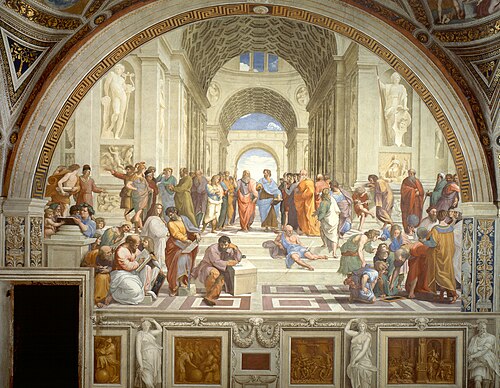Philosophynoun
The love of wisdom.
Philosophynoun
(uncountable) An academic discipline that seeks truth through reasoning rather than empiricism.
Philosophynoun
(countable) A comprehensive system of belief.
Philosophynoun
(countable) A view or outlook regarding fundamental principles underlying some domain.
Philosophynoun
(countable) A general principle (usually moral).
Philosophynoun
(archaic) A broader branch of (non-applied) science.
Philosophynoun
A calm and thoughtful demeanor; calmness of temper.
Philosophynoun
synonym of small pica|nodot=1.
Philosophyverb
To philosophize.
Philosophynoun
Literally, the love of, inducing the search after, wisdom; in actual usage, the knowledge of phenomena as explained by, and resolved into, causes and reasons, powers and laws.
Philosophynoun
A particular philosophical system or theory; the hypothesis by which particular phenomena are explained.
Philosophynoun
Practical wisdom; calmness of temper and judgment; equanimity; fortitude; stoicism; as, to meet misfortune with philosophy.
Philosophynoun
Reasoning; argumentation.
Philosophynoun
The course of sciences read in the schools.
Philosophynoun
A treatise on philosophy.
Philosophynoun
a belief (or system of beliefs) accepted as authoritative by some group or school
Philosophynoun
the rational investigation of questions about existence and knowledge and ethics
Philosophynoun
any personal belief about how to live or how to deal with a situation;
Philosophynoun
a particular system of philosophical thought
Philosophynoun
the study of the theoretical basis of a particular branch of knowledge or experience
Philosophynoun
a theory or attitude that acts as a guiding principle for behaviour
Philosophy
Philosophy (from Greek: φιλοσοφία, philosophia, 'love of wisdom') is the study of general and fundamental questions, such as those about existence, reason, knowledge, values, mind, and language. Such questions are often posed as problems to be studied or resolved.
Humanitiesnoun
(obsolete) nodot=a: the study of Ancient Greek and Latin, their literature, etc.
Humanitiesnoun
The study of language, literature, the arts, and philosophy, sometimes including religion
Humanitiesnoun
studies intended to provide general knowledge and intellectual skills (rather than occupational or professional skills);
Humanities
Humanities are academic disciplines that study aspects of human society and culture. In the Renaissance, the term contrasted with divinity and referred to what is now called classics, the main area of secular study in universities at the time.




























